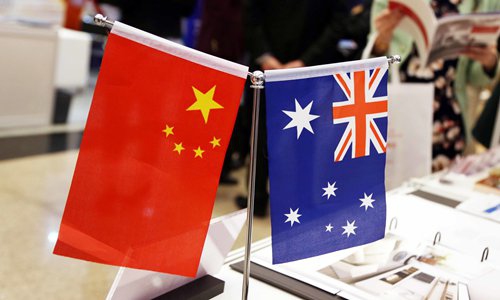Potential tariffs not punishment but wake-up call to Australia
Source:Global Times Published: 2020/5/12 23:48:03

File photo
The relationship between China and Australia has been strained in recent years due to the latter's unfriendly actions against the former, including but not limited to blocking Chinese takeovers of Australian businesses, banning Huawei's 5G network from entering its market on national security grounds, and a white paper urging an alliance with the US to contain China.To make things worse, Australia's recent attempt to appeal for the support of the US, Germany and France of a so-called "independent" inquiry into "the origin and spread" of the COVID-19 outbreak has exacerbated the tensions between the two countries, casting a shadow over the bilateral trade that is crucial to Australia's economy.
Against such a backdrop, growing concern over potential retaliatory measures from China seems totally justified given Australia's heavy economic reliance on China.
The latest meat import suspension and the possible imposition of major tariffs on Australia's barley exports don't necessarily represent China's economic punishment for Australia, though they may serve as a wake-up call for Australia to reflect on its economic links with China.
China is the largest destination for Australian exports, accounting for 32.6 percent of the total in 2018/19. China is also the biggest market for Australia's major products and services, such as coal, iron ore, wine, beef, tourism and education. Chinese students have been major contributors to Australia's education revenue, accounting for about one-third of the country's education exports.
Moreover, Australia has become the world's leading exporter of minerals, with China being the biggest buyer. According to the General Administration of Customs, China continued to be the largest importer of iron ore with 1.07 billion tons in 2019, while about 70 percent came from Australia, which thus became the largest exporter of iron ore. China's huge purchases have also made Australia the world's largest exporter of coal and liquefied natural gas (LNG).
While China is the only choice for Australia's massive commodity exports, Australia is not necessarily the only option for China. There are also other countries like Brazil that can supply huge amounts of iron ore, coal or LNG to China.
Of course, China's willingness to maintain a cooperative relationship with Australia hasn't changed, and it is now up to Australia to decide what to do next.
It is worth mentioning that Australia is actually in competition with the US in the Chinese market. If China reduces its beef imports from Australia, it could make up for the loss with imports from the US. And the phase one trade deal between the world's two largest economies is a solid guarantee of their trade relations, but there is no guarantee for Australian trade. No one would mourn if it loses Chinese market amid escalating bilateral tensions.
If that's the outcome Australia wants to avoid, it is time for the country to start sending positive signals to prevent bilateral relations from further deteriorating.
Posted in: GT VOICE